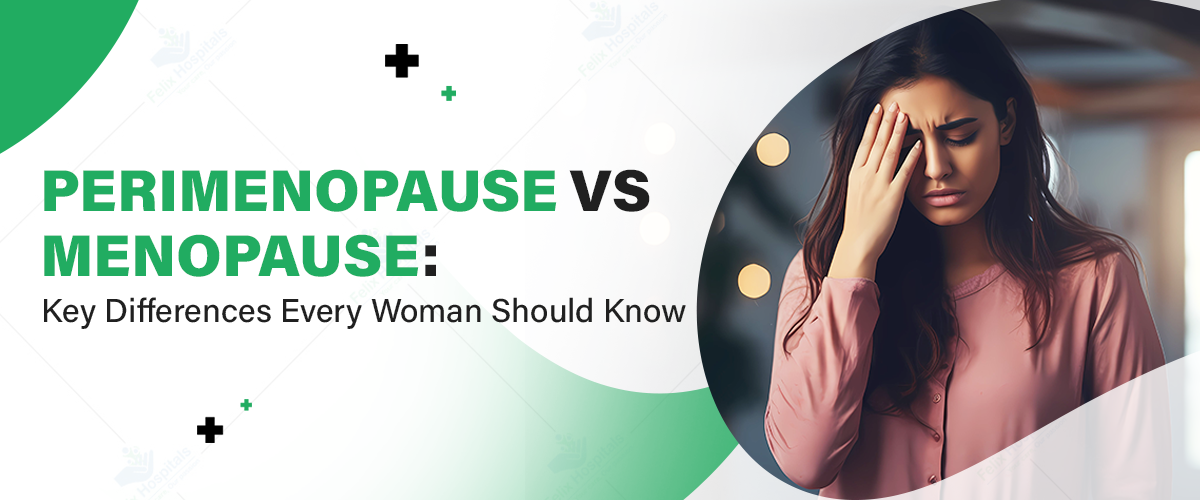
Subscribe to our

Perimenopause and menopause are natural stages in a woman’s life, marking significant hormonal changes that impact various aspects of health. Understanding these differences is crucial for managing health effectively during these phases. Whether you're navigating perimenopause or experiencing menopause, it is essential to have the support of medical professionals, such as the best gynecologist hospital in Noida, to guide you through this journey.
Contact us at +91 9667064100 for a consultation with one of our specialists and take control of your health journey today.
Definition of Perimenopause:
Perimenopause refers to the transitional phase before menopause when a woman’s body begins to undergo hormonal changes. It marks the time when the ovaries gradually produce less estrogen, leading to irregular menstrual cycles and various symptoms.
Age Range:
Perimenopause usually begins in a woman’s 40s, but it can start earlier or later depending on genetics and other factors.
Hormonal Changes:
During perimenopause, estrogen and progesterone levels fluctuate, causing changes in the menstrual cycle and triggering symptoms like hot flashes, mood swings, and sleep disturbances.
Duration:
Perimenopause typically lasts 4-8 years. However, the duration varies among individuals.
Symptoms:
Definition of Menopause:
Menopause marks the point when a woman’s menstrual periods stop entirely, signaling the end of her reproductive years. It is diagnosed when a woman has not had a period for 12 consecutive months.
Age Range:
Menopause typically occurs around age 50, though it can occur earlier or later.
Hormonal Changes:
During menopause, the ovaries stop producing eggs, and estrogen and progesterone levels decline significantly, leading to the cessation of menstruation.
Symptoms:
| Aspect | Perimenopause | Menopause |
|---|---|---|
| Hormonal Changes | Fluctuating hormone levels | Stable but low hormone levels |
| Menstrual Cycle | Irregular periods | No periods for 12 months |
| Symptoms | Hot flashes, mood swings, sleep issues | Hot flashes, vaginal dryness, mood changes |
| Duration | Lasts 4-8 years | Permanent stage (no more menstruation) |
Both perimenopause and menopause bring increased risks for several health conditions:
Consulting healthcare professionals during perimenopause and menopause can help manage symptoms and ensure overall health during these life stages.
It is important to consult a doctor if you experience:
Regular check-ups during perimenopause and menopause help ensure that symptoms are managed effectively, and underlying health conditions are addressed.
At Felix Hospitals, we have a team of expert gynecologists who specialize in treating perimenopause and menopause. They provide personalized care to manage symptoms and promote overall well-being. Our doctors include:
Visit Felix Hospitals to consult our experienced gynecologists and receive personalized care to manage your symptoms. Book your appointment now!
Understanding the key differences between perimenopause and menopause can empower women to make informed decisions about managing their health during these stages. Each woman’s experience is unique, so it is essential to seek expert advice and support to ensure optimal health during perimenopause and menopause. Stay informed and consult the best gynecologists for personalized care and guidance.
1. How to distinguish perimenopause from menopause?
Ans. Perimenopause has fluctuating hormones and irregular periods, while menopause is diagnosed after 12 months without a period and steady hormone decline.
2. Can menopause happen before 50?
Ans. Yes, premature menopause can occur before 40 due to genetics, medical conditions, or treatments like chemotherapy.
3. What is HRT and is it safe?
Ans. HRT supplements estrogen and/or progesterone to manage symptoms but should be discussed with a doctor for risks and benefits.
4. How long does menopause last?
Ans. Menopause is permanent, but symptoms can last for several years, often decreasing in intensity over time.
5. How to manage hot flashes?
Ans. Stay hydrated, dress in layers, and use relaxation techniques. Severe cases may require medication.
6. Diet tips for perimenopause/menopause?
Ans. Eat calcium-rich foods, vitamin D, and antioxidants while avoiding alcohol and caffeine.
7. Can I get pregnant during perimenopause?
Ans. Yes, fertility declines but contraception should still be used until 12 months without a period.
8. How does menopause affect mental health?
Ans. Hormonal changes can cause mood swings, anxiety, and depression; professional support and stress-reducing activities help.
9. When should I see a doctor?
Ans. Consult if symptoms interfere with daily life, like severe hot flashes, mood swings, or signs of osteoporosis or cardiovascular issues.